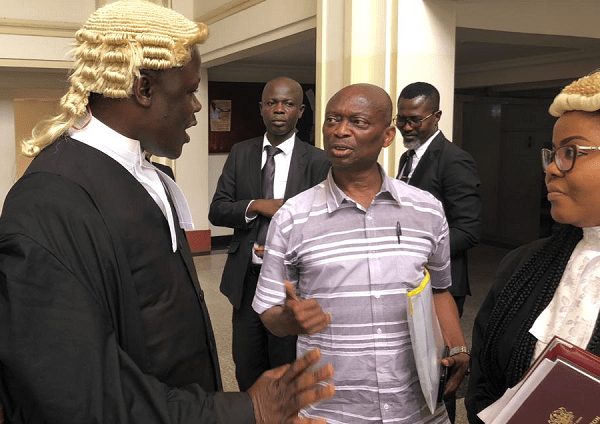
Supreme Court throws out Kweku Baako
The Supreme Court has thrown out a suit by the Editor-in-Chief of the Crusading Guide newspaper, Mr Abdul Malik Kweku Baako, challenging the removal of Mrs Charlotte Osei as the Chairperson of the Electoral Commission (EC).
In a unanimous decision yesterday, a seven-member panel of the court, presided over by Mr Justice Julius Ansah, held that Mr Baako did not raise any issue for constitutional interpretation and, therefore, failed to invoke the original jurisdiction of the court.
Advertisement
“The action is, therefore, struck out,’’ the court held.
Other members of the panel were Justices Anin Yeboah, Paul Baffoe-Bonnie, Sule Gbadegbe, Yaw Appau, Nene Amegatcher and Professor Nii Ashie Kotey.
Premise
Mr Baako had gone to the apex court with a case that the Chief Justice’s Committee that recommended the removal of Mrs Osei acted unconstitutionally because the allegations levelled against her were not in relation to her core functions as the Chairperson of the EC, as stipulated in Article 45 of the 1992 Constitution.
The core functions of the EC, as stated in Article 45, include the compilation and revision of the voters register, organising and supervising public elections and referenda and demarcation of electoral boundaries.
Mr Baako had argued that Article 146 of the 1992 Constitution, which deals with the removal of the EC Chairperson, was in relation to allegations founded on acts of stated misbehaviour or incompetence of the core functions of the Chairperson of the EC.
The plaintiff, therefore, wanted an interpretation and certain declarations from the court that the whole process involving the petition, the Chief Justice finding a prima facie case against Mrs Osei, the recommendation by the committee and her subsequent removal by President Nana Addo Dankwa Akufo-Addo based on the recommendation of the committee were in violation of articles 43 (1) (a), 44 (2), 45 and 146 (1) of the 1992 Constitution and for that matter null, void and of no effect.
‘Stated misbehaviour’
Mr Baako was represented by Lawyer Samson Lardy Ayenini, while the state was represented by a Deputy A-G, Mr Godfred Yeboah Dame.
Mr Ayenini failed to convince the court with his argument when the panel asked him to answer the question whether or not ‘stated misbehaviour’, as stipulated by Article 146, was only in relation to the core functions of the EC Chairperson.
Counsel had argued that the petition that led to Mrs Osei’s removal could not qualify as a competent petition under Article 146 of the 1992 Constitution because it was about procurement infractions and not the core functions of the EC.
Mr Justice Gbadegbe then told Mr Ayenini that ‘stated misbehaviour’ was not just in relation to core functions but any behaviour that could tarnish the image of the EC.
He said per the Constitution, the EC Chairperson and certain officials were treated as justices of the superior courts and, therefore, such persons must be above reproach.
He gave an example of how badly the public would perceive a good judge who wrote good judgements but drank and disgraced himself in public.
“The EC chairperson and certain officials are equated to us (judges). They should not only enjoy the privileges but should also be above reproach,’’ he said.
Mr Justice Baffoe-Bonnie also asked counsel how the EC Chairperson could perform her core functions without indulging in any procurement activity.
“The EC is an independent body and there is no way it can perform its core functions without procuring ballot boxes, papers, among other things,’’ he said.
In response, Mr Ayenini argued that if such a broad interpretation was put on Article 146, justices of the superior courts and other officials whose removal was based on Article 146 would be endangered.
The court, however, rejected his argument and said he had failed to persuade it that Article 146 required any interpretation or enforcement.
Procurement is core function
For his part, Mr Dame said Mr Baako’s case that Mrs Osei’s removal was unconstitutional because it was not in relation to her core functions of organising elections was “erroneous’’.
According to him, the functions of the EC, as stipulated in Article 45 of the 1992 Constitution, included other functions as might be prescribed by law.
“The Public Procurement Act, 2003 (Act 663) is such law which imposes the duty and function on the EC to undertake procurement in accordance with the act, and there is no way the EC can carry out all its other functions without undertaking public procurement. Thus procurement is one of the functions of the EC,” the Deputy A-G argued.
Background
On June 28, 2018, President Akufo-Addo removed Mrs Osei and her two deputies, Mrs Georgina Opoku-Amankwa and Mr Amadu Sulley, from office based on the recommendations of a committee set up by the Chief Justice to investigate the officials over allegations of corruption and misconduct.
It followed certain petitions that accused the three principal officers of the EC of indulging in unlawful activities.
Writer’s email: [email protected]